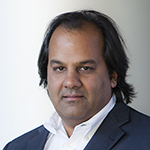January 2016

Atul Malhotra, MD
The ATS International Conference represents an exciting venue for scientific exchange, networking, and a really good time. During ATS 2016 in San Francisco, May 13-18, we will have our usual mix of strong science, clinical education, medical education initiatives, and numerous opportunities for graduate and medical students, medical residents, clinical and postdoctoral fellows, and junior faculty to get involved. We received record numbers of abstracts, so we are anticipating our best conference ever.
For those of you on the fence about attending, I’d like to share the top five reasons why you should join me and your colleagues from around the world:
- Craig Venter, PhD, will be our speaker at the Opening Ceremony on Saturday, May 14. Dr. Venter was a leader in the sequencing of the human genome and has made considerable contributions to medicine, through both academia and industry. In a finance publication, it was speculated that he could become the world’s first trillionaire!
- The ATS Keynote Series will feature eight lectures, with two presented each morning throughout the conference. The topics of the lectures were chosen based on extensive discussions and input from members, and in future years, we hope to cover topics we’ve missed. I’m pleased to announce the topics and presenters of each lecture:
- ARDS—Brian Kavanagh, MB, BSc, chair of the Department of Anesthesia at the University of Toronto, the Dr. Geoffrey Barker Chair in Critical Care Medicine at the Hospital for Sick Children and University of Toronto, and research director of the Department of Critical Care Medicine at the Hospital for Sick Children.
- Asthma—Serpil Erzurum, MD, chair of the Department of Pathobiology, joint staff with Respiratory Institute, and the Alfred Lerner Memorial Chair in Innovative Biomedical Research at the Cleveland Clinic.
- COPD—Bartolome Celli, MD, physician at Brigham and Women’s Hospital and professor at Harvard Medical School.
- Drug Discovery—Brian Kobilka, MD, a Nobel Laureate, and Helene Irwin Fagan Chair in Cardiology and professor of chemical and systems biology at the Stanford School of Medicine.
- IPF—Talmadge King, MD, dean of the University of California San Francisco School of Medicine and vice chancellor of Medical Affairs.
- Lung Cancer—Avrum Spira, MD, MSc, professor of medicine, pathology & laboratory medicine, and bioinformatics, chief of the Division of Computational Biomedicine at Boston University School of Medicine, and director of Translational Bioinformatics Program, Clinical and Translational Science Institute.
- PH: PAH and CTEPH—Nick Kim, MD, clinical professor of medicine, director of Pulmonary Vascular Medicine, director of Pulmonary and Critical Care Medicine Fellowship at the University of California, San Diego School of Medicine and clinical service chief of Thornton PCCM.
- Sleep Apnea—John Stradling, MD, MBBS, emeritus professor of respiratory medicine and consultant physician at the Nuffield Department of Medicine at University of Oxford.
- The President’s Symposium will focus on applied physiology, a discipline which is far from dead—but alive and well! I’m pleased to announce the topics and presenters of each lecture:
- Cell mechanics—Jeffrey Fredberg, PhD,professor of bioengineering and physiology at the Harvard School of Public Health.
- History of How Physiology has Adapted to New Challenges—Jeffrey Drazen, MD, editor-in-chief of the New England Journal of Medicine.
- Lung Mechanics in ARDS—Marcelo Amato MD, PhD, professor at the University of São Paulo.
- Sepsis—Kevin Tracey, MD, president and CEO, Feinstein Institute for Medical Research.
- Sleep Apnea Pathogenesis—Magdy Younes, MD, PhD, professor of medicine at the University of Manitoba.
- And young investigators to be determined.
- Katie Meyler, one of the “Ebola Fighters” collectively recognized by TIME magazine as the 2014 Person of the Year, will be speaking at our Plenary Session on Tuesday, May 17. David Gozal, MD, will also be inaugurated as president at that session. Watch this three-minute video of Ms. Meyler—I’ve seen it over one hundred times, and it still gets me every time!
- Programs for Early Career Professionals this year will include the Global Scholars, Student Scholars, Resident Boot Camp, and the Fellows Track Symposium. My goal as president is to attract and retain the best and brightest into our field through these programs, and I am psyched about all we have to offer this year!
These are just five reasons, and I can list many more—for instance this year’s J. Burns Amberson Lecturer, Marlene Rabinovitch, MD, whose research focus is pulmonary arterial hypertension. Dr. Rabinovitch is the Dwight and Vera Dunlevie Professor of Pediatrics and professor of developmental biology at Stanford University School of Medicine, and research director of the Vera Moulton Wall Center for Pulmonary Vascular Disease; the Amberson Lecture recognizes her major lifetime contributions to respiratory health. I can’t wait to see everyone there!

